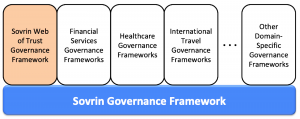July 8, 2019

By Drummond Reed, Chair of the Sovrin Governance Framework Working Group
After finishing V2 of the Sovrin Governance Framework, the Sovrin Governance Framework Working Group (SGFWG) has launched four task forces to continue exploring the cutting edge of policy for self-sovereign identity (SSI) and verifiable credentials. Each of these task forces is tackling a problem space that was selected by its members as their highest priority need at this point in the development of SSI infrastructure.
All of these task forces are open to new members; anyone with a genuine interest in supporting the work is invited to participate. For more details about each task force and instructions on how to join, just click the headings in the list below.
The complex topic of digital guardianship is critical to extending the benefits of SSI to individuals who are not in a position to wield a self-sovereign identity directly, either due to lack of internet access, lack of digital literacy, or physical or mental incapacity. Dozens of different groups need digital guardianship including refugees, homeless persons, babies or young children, elderly parents, dementia patients, etc.
This task force, currently co-lead by Nicky Hickman and Peter Simpson, is dedicated to exploring, understanding, architecting, and developing recommended policies regarding digital guardianship using SSI infrastructure. The task force is already working with multiple NGOs and humanitarian organizations that have an urgent need to develop solutions to this problem.
As illustrated in this diagram from the Introduction section of the Sovrin Governance Framework Master Document, the Sovrin Governance Framework V2 was designed to serve as the foundation for other domain-specific governance frameworks.

Each DSGF defines the policies needed by a specific group of issuers, holders, and verifiers of digital credentials. The purpose of the DSGF Task Force, co-lead by Chris Raczkowski and Drummond Reed, is to develop tools and guides to assist in the development of DSGF. The task force will also assist (to available capacity) authors working on building DSGFs.
SSI and IoT has become a very hot topic—the recent GS1 Connect conference included a panel devoted to exactly that topic. The truth is that “things” not only need Decentralized Identifiers (DIDs), they also need verifiable credentials to assert ownership/controllership and to prove they can be trusted. This is why the “Thing” branch of the Entity taxonomy in the second generation of the Sovrin Glossary is now as rich as the “Identity Owner” branch was in the first generation.

The SSI for IoT Task Force, lead by Michael Shea, is focused entirely on exploring the special considerations of applying SSI to the Internet of Things. In addition, this Task Force will actively assist (to its available capacity) developers working on SSI for Things projects.
In any hot new area of technology, one of the most frequently asked questions is, “How do you make money with it?” With SSI, this question is even more important because the very nature of SSI—as represented by the Core Principles of the Sovrin Governance Framework—do not lend themselves to some business models that predominate in today’s Web (e.g., digital ad tech and surveillance capitalism).
The goal of the Business of SSI Task Force, lead by Riley Hughes of the Sovrin Foundation, is to explore the different business models that can work within and sustain a SSI ecosystem— both by being consistent with its principles and by taking advantage of its unique new features and benefits. This Task Force will also assist (to its available capacity) entrepreneurs working to develop new businesses within the Sovrin ecosystem.
###
Learn more about the Sovrin Governance Framework here or contact the Sovrin Foundation to volunteer.
« Use case spotlight: Anonyome Labs integrates SSI into its Sudo Platform and MySudo application Technology Innovators Launch New Incubator to Accelerate Adoption of Self-Sovereign Identity »